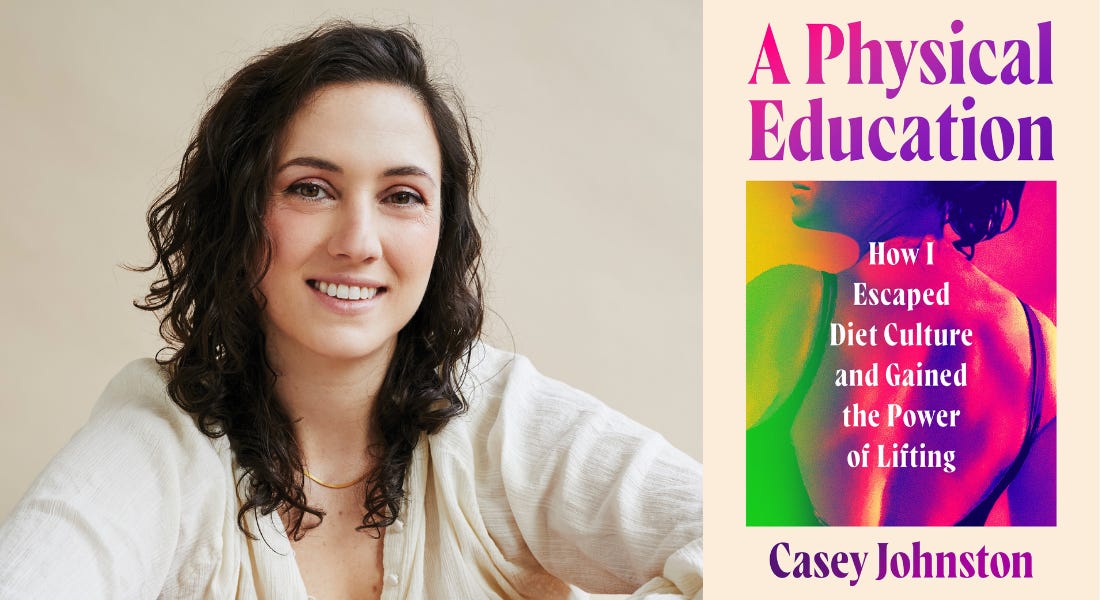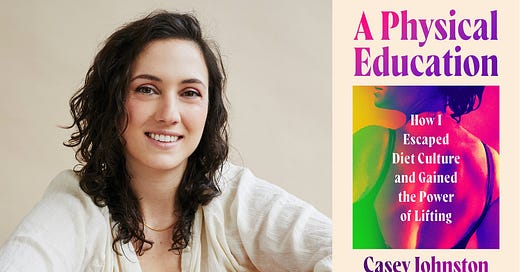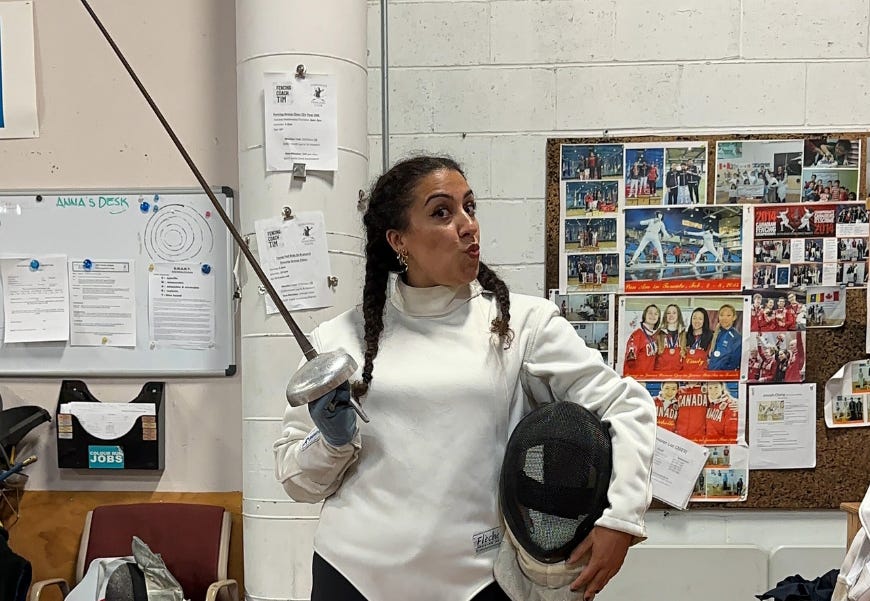
There’s a point in Casey Johnston’s new book, A Physical Education, that’s clarifying for me. In chapter 26, after nearly 200 pages chronicling her journey into weightlifting and all the lessons she learned (or unlearned) along the way, Johnston recounts going home for Thanksgiving and trying to pitch strength training to her mom.
The effort doesn’t get very far: Johnston takes her mother to the gym and tries to teach her to squat. She complains and argues the whole time. When they’ve finished lifting, Johnston’s mom is not convinced it was enough of a workout so she steps away to do more of the kind of exercise she’s used to.
Later on, Johnston broaches the topic of calorie expenditure and how much her mom ought to eat, which leads to her mother saying she’ll gain weight if she eats more. Johnston asks why it would be so bad if she gained three pounds. Her mother’s response:
“No one likes fat old women.”
The whole interaction is stunningly familiar. The back-and-forth between a mother and daughter, where the daughter is trying to share newfound knowledge that she believes will help her mother be less miserable, only to have the mother take it as an insult to her own intelligence: “Well, I’m just stupid, I guess.”
How do we all have the same mom? I wondered, but it wasn’t just the mother-daughter aspect. The scene drew to mind conversations I’ve had with Gen X women worried about their waistlines and posts upon posts in women’s fitness groups on Facebook and Reddit where women are asking for advice on how to lose a measly six pounds and the same “calories in, calories out” garbage gets regurgitated in the comments, regardless of whether the person posting mentions brain fog and fatigue in workouts.
Attempts to challenge the previous generation’s long-held notions about bodies, exercise, and scales seem mostly futile.
Casey Johnston has been writing about lifting for years. She started her column, Ask a Swole Woman, in 2016, originally publishing through The Hairpin, then Self and Vice, before going independent with her newsletter She’s a Beast. Through Ask a Swole Woman and She’s a Beast, Johnston built a reputation for herself as a source of reliable, no-BS fitness advice that made gym bro topics accessible to people with no training background.
In many respects, A Physical Education, releasing May 6, is a culmination of Johnston’s fitness writing, but it’s not a manual or book of how-tos. Instead, the hybrid memoir tells Johnston’s own fitness story, taking tangents along the way to dive into fitness history and science and debunk common misconceptions about strength training, body recomposition, and food. Along with reading about Johnston’s first failed attempt at benching the empty barbell (what the kids call a canon event), you learn alongside her about the simple elegance of a strength program, that women being cold all the time may actually be due to not eating enough, how muscles rebuild themselves during rest, and that the difference between the sexes in terms of relative number of fast-twitch versus slow-twitch muscle fibers is overblown.
Many of the misconceptions are things Johnston had to unlearn in order to fully embrace her own strength. While lifting gave her permission to question what she’d always assumed about her body, questioning those assumptions allowed her to get more out of lifting.
As Johnston grows stronger, she marvels at her body’s ability to adapt. She flexes in the mirror and admires the previously invisible muscles on her back. She moves the giant bag of kitty litter with remarkable ease. She’s stunned that someone like her could get strong like this. Why doesn’t everyone lift?
This is why she starts telling people about it. Her friends. Her mom. (I assume this is also why she started writing her column.)
A Physical Education is basically a book-shaped show-and-tell about why Casey Johnston loves lifting. She’s not making an argument. She’s just showing us: This is how lifting changed me and this is everything I’ve learned about it. All benefits, basically no downsides. And did I mention that you get to eat a lot? Cause you do. You need to eat a lot if you want to get stronger.
It’s as if she stepped back from that conversation with her mom, evaluated all the things that might hold her mom back from trying to lift heavier, and decided to write what she wished her mom would know — about Johnston’s personal experience and the facts that support her pursuit of strength.
When you find something you love, you want other people to love it too. When you discover a new way of living that breathes more confidence and energy into your existence, you want the people you love to reap the same benefits. For those of us who love fitness, the challenge is to share that love without being obnoxious, without being pushy, without coming across as arrogant know-it-alls. Hopefully, without being challenged to an impromptu arm-wrestling match.
For women who love lifting, the waters can seem especially choppy. Our bodies are often in the limelight. Comparison is a commonly harbored disease. You never know what someone might take personally. Is it possible to be sensitive and honest and direct all at once?
One particular strength of A Physical Education is that Johnston is sharing her own story. Yes, it’s full of facts and figures that preach the benefits of lifting, but it’s grounded in her individual experience. She was worn out from years of endless cardio and dieting. She didn’t consider herself an athlete. She didn’t think she was strong. If an everyday, non-lifting, non-gym-going person is looking for someone to relate to, Casey Johnston is it. And if they dive into her journey, join her on the floor of Richie’s Gym in Bushwick, Brooklyn, they might just be on the way to their own re-education.
Previously in Women’s Barbell Club…
Life Cycle of the Female Athlete
Are women’s bodies anomalies in sports? Does a female athlete’s career end with adolescence, motherhood, or menopause? Christine Yu’s answer is a definite “no”.
An Olympian Like the Rest of Us
If you’ve ever wondered how a normal, average Jane would measure up to Olympic athletes on the competition field, Simona Stallone is here to help. This summer, the 27-year-old from Toronto, Canada, set out to attempt as many Olympic-inspired feats as possible, despite the fact th…
How to get — and stay — motivated for your workout routine
By now, the New Year’s rush at the gym is long behind us. The “new year, new you” enthusiasm has worn off like the screen printing on a T-shirt from 1995. What started as an ambitious drive toward a fitter future has, for many, dwindled to basically nothing.
Recommended Reads
Big Shoulders Are In (Elle)
What Is Hyrox and How Is the Workout Different From CrossFit? (Self)
Sleep is essential — researchers are trying to work out why (Nature)
What’s coming next?
More Injury Diaries or something out of left field







Love this! Please, more book reviews of fitness books aimed at women that aren’t about being “lean and slim in 60 days!” or some variation.
My mom and I have had similar conversations where I try to explain something I think she’d find interesting and she assumes that what I’m really saying is that I think she’s an idiot. 😭
I was already excited to read this book (preordered multiple copies so I could read with a few friends!) but your review really touched me. “ When you find something you love, you want other people to love it too.” Yes!!